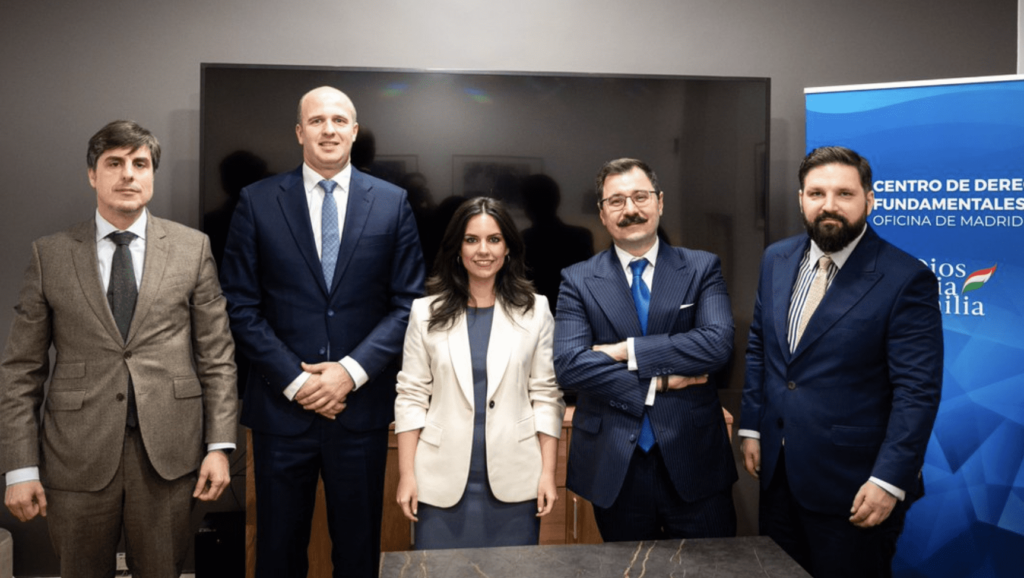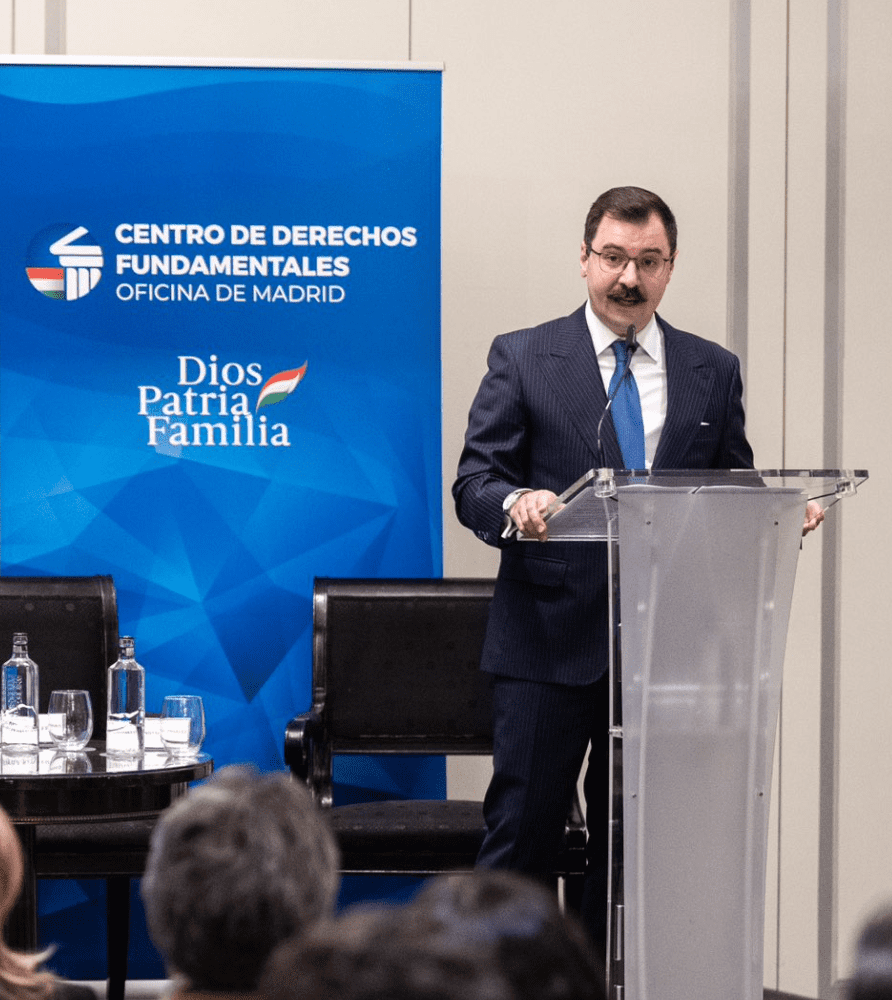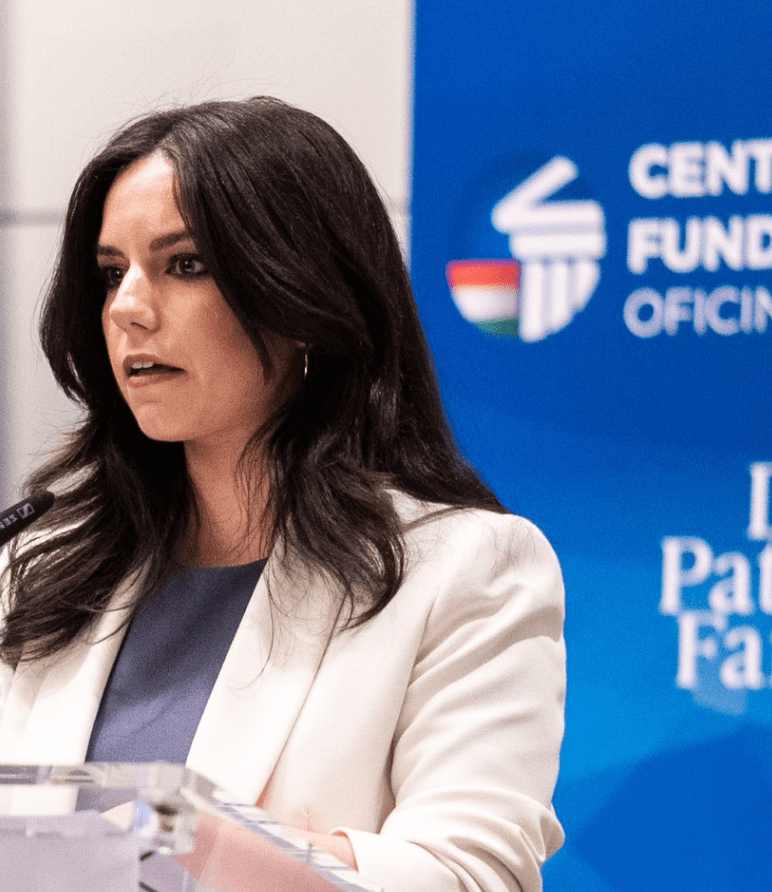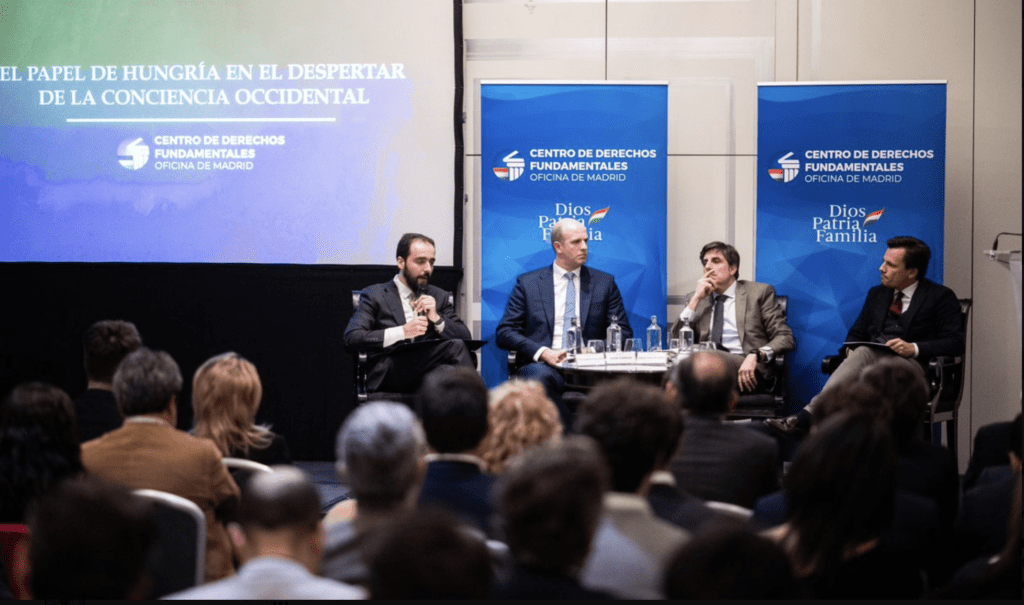
L to R: Jorge Martín Frías, Vajk Farkas, Pepa Rodríguez de Millán, Miklós Szánthó, and István Kovács
One of the things that has always frustrated me about the modern European Right is its inability—or is it reluctance?—to form international strategic partnerships and work together with their natural allies in other countries. This has been changing in recent years. But, in many ways, the Right is still trying to catch up to the international Left. That’s why the courageous efforts and moral leadership of Hungarian institutions like the Center for Fundamental Rights (CFR) have made them models for many on the Right.
The latest development in cross-border efforts on the Right came two weeks ago, when the CFR opened its first international office in Madrid. With a well-attended launch event on March 20, the CFR marked a new phase in its ongoing efforts to “build bridges” across Europe—and expand their networks around the world. As Vajk Farkas, director of the new Madrid office, noted during that launch event, “what the political Right is missing is a certain internationalization.” The opening of the CFR Madrid office promises to fill this gap.
“I think the need for patriotic forces to cooperate internationally has been made manifest—and is growing stronger,” Farkas told me after the launch. “However, we need greater awareness that we need to put aside our differences and strengthen our mutual support, since we have many important shared values and interests.”
During his comments at the launch, held at the Palace Hotel in Madrid, Farkas said the CFR Madrid office will serve as a meeting point for the Right—not just in Hungary and Spain but across the Iberosphere. Reaching the countries of the Iberosphere is important because they are also fighting the same battles currently being fought across the West. “And we want to give [them] a certain hope.”
Despite obvious cultural differences among nations, CFR’s expansion into Spain—and, by extension, the Iberosphere—is really about “rescu[ing] the values that unite us.” It is not about imposing the same way of thinking on others. “The mission of the new Madrid office,” he elaborated in later comments to me, “is thus about becoming one of the key players of such international cooperation.”

The launch of the CFR’s Madrid office featured a keynote speech from Miklós Szánthó, the director-general of the CFR. Szánthó—who spoke in Spanish to the delight of the audience—said the CFR promotes and defends principles that are common to all those on the Right across Europe and around the world: “God, homeland, and the family.” And with its expansion into Spain, he said the CFR will be able to further promote cooperation in these areas—particularly between key political and intellectual actors on the Hungarian and Spanish Right.
Szánthó emphasized the importance of working together, by promoting common principles and values in defense of the West’s Judeo-Christian roots. “Only together will we be able to forge a right-wing Golden Age,” he said. And while such a Golden Age might seem impossible, he noted, Hungary’s history has shown that “what seems impossible today can be possible tomorrow.” So, he said, “it is not impossible to defeat the São Paulo Forum, the European Left, the Open Society Foundations—or even Biden’s Democratic Party!”
Szánthó’s remarks were followed by a speech by Pepa Rodríguez de Millán, a VOX spokesman. Welcoming the CFR to Madrid, she praised its ongoing work in defense of traditional values, its vigorous efforts to reclaim the cultural space, and its dogged resistance against left-wing ideologies. In particular, she cited its defense of traditional families and life, issues that have been “silenced in many countries of the EU.”

She also praised Hungary’s pro-family policies: “There is nothing healthier than wanting to defend one’s own: the family, life, and the nation.” Today, all of these are threatened by hostile and toxic ideologies. And supporting these ideologies is a whole cultural infrastructure that the Left has used to impose a progressive cultural hegemony, she said.
“Hungary has known how … to give a confident response” to this left-wing cultural hegemony, she said, and change it. In Spain, in contrast, “we have normalized words that previously belonged to small left-wing groups.” And those “who should have defended the cultural space,” she lamented, instead “gave it up.”
Farkas echoed this later, saying: “Spain used to be one of the pillars of Western Civilization.” It had its own traditions and “a long history that includes truly glorious moments starring fantastic patriots,” he said. But today, instead, “what we see in Spain is the result of the Gramscian methods adopted by the Spanish Left,” he said, “combined with the Right’s frustrating abstention from the cultural battleground.” So the need to mount a confident—and fearless—response to left-wing ideologies is critical.
An interesting roundtable discussion on “Hungary’s role in the awakening of Western consciousness” followed the speeches. With Jorge González-Gallarza, a senior coordinator at the CFR’s Madrid office, as moderator, the various panelists—which included Jorge Martín Frías, director of the Fundación Disenso, Fernando Nistal González, executive director of the think-tank CEU-CEFAS, and Vajk Farkas—spoke about recent successes and failures in the culture wars.

Frías predicted further growth of patriotic and conservative forces in Europe, especially as “the demonization of the legitimate concerns of the middle and popular classes” continues at the hands of progressives and social democrats. He also spoke of the role that Spain plays as a bridge with nations of the Iberosphere, citing their common historical and cultural heritage. “Everything is linked,” he said. Frías also highlighted the important role that Prime Minister Viktor Orbán has played in defending conservative values against progressive European institutions. “Hungary is the benchmark.”
Nistal also praised the Hungarian government’s efforts in defending policies that favor the family. And they do so, he said, “without complexes” or insecurities. “Not only are their ideas carried out with courage and determination but they have also achieved results,” he said. Hungary is—or should be—an example for everyone, he said. And then, looking ahead to the European elections in June, he noted that “the average [European] citizen has realized the failure of the Left’s proposals”—and this realization could lead to welcome electoral changes. “We must have hope that the European political course will be made straight a little.”
The opening of the CFR’s Madrid office is an exciting development that promises to bring many opportunities for the Right. Farkas said, “the path forward for the right-wing in Europe is to learn from what patriotic Hungarian forces have been able to accomplish in the last few years—and not to hesitate to put into practice what Gramsci preached.” This means not to hesitate to seek to influence the culture and gain cultural hegemony.
Additionally, thinking internationally is an important tasks for the Right. That is why one of the core objectives of having an office in Madrid is for the CFR—whose flagship project, CPAC Hungary, will take place this year on April 25-26—to be the first thing that comes to the mind of an Ibero-American patriot when he thinks of Hungary (and vice versa), Farkas told me. This will take a lot of work—but “we are optimistic and remain committed to [adding] value to international right-wing cooperation.”
Those in attendance at the launch event—including Alfonso Bullón de Mendoza, president of the Catholic Association of Propagandists and president of El Debate, as well as Andrés Pastrana, the former president of Colombia and current president of the Centrist Democrat International—seem to share that view. As do I.
For someone who has worked on the European Right for years, this is all welcome news. Right-wing actors and institutions across Europe—and in other parts of the world—have enormous potential. But it takes the example of organizations like CFR to show the way. And I agree with Farkas, who later told me: “I’m convinced that we can learn a lot from each other. And as a friend of mine once said: the Iberosphere is a great reservoir of Western Civilization—and, just like Hungary, it also offers the hope for us to reclaim it.” The West is in a death spiral—but with the cooperation of confident, patriotic nations, there may be a way to turn that around.
